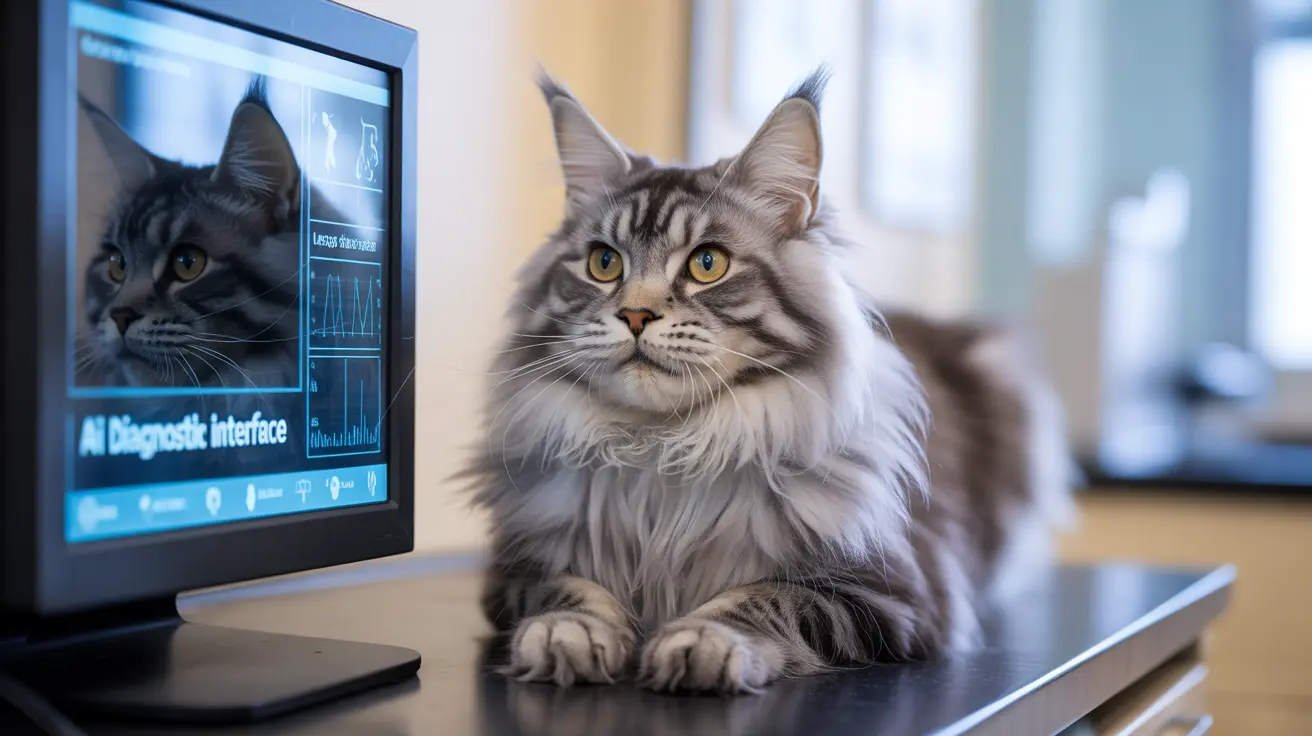Introduction: AI Ushers in a New Era for Veterinary Medicine
The landscape of veterinary medicine is undergoing a remarkable transformation, driven by the integration of artificial intelligence (AI) into diagnostic processes. As veterinarians face increasingly complex challenges in diagnosing animal health conditions—especially when symptoms are subtle or when immediate action is crucial—AI veterinary diagnostics emerges as a game-changing solution that's reshaping the industry.
Leading this revolution are innovative platforms like PetsCare AI, which harness cutting-edge technologies to deliver unprecedented accuracy and efficiency in veterinary care. By combining digital cytology tools with AI-powered pet care systems, these solutions are setting new standards for diagnostic precision and clinical workflow optimization.
The impact of AI in vet clinics extends far beyond basic automation, offering a comprehensive approach to animal health that benefits both practitioners and their patients. Let's explore how this technological advancement is revolutionizing veterinary practice and improving outcomes for our animal companions.
Accelerating Diagnosis Through AI Innovation
Modern veterinary practices are witnessing a dramatic improvement in diagnostic capabilities thanks to AI for animal health solutions. These sophisticated systems leverage machine learning algorithms to analyze medical data with unprecedented speed and accuracy, allowing veterinarians to detect health issues in pets earlier and more reliably than ever before.
Advanced Imaging and Analysis
- Real-time radiograph interpretation: AI algorithms process radiographic images on the spot, providing instant feedback and identifying areas of concern without delay.
- Instant detection of abnormalities: By comparing thousands of images, AI can pinpoint subtle irregularities that could indicate diseases or injuries, often catching issues that might elude the human eye.
- Comprehensive analysis of medical imaging: AI delivers a detailed assessment, reviewing various views and components for a thorough diagnostic perspective.
- Enhanced accuracy in diagnosis: Overall, these features significantly reduce misdiagnoses and ensure pets receive prompt, appropriate care.
Digital Cytology Revolution
- Immediate sample analysis: Digital cytology powered by AI parses cell samples quickly, delivering actionable results in minutes rather than days.
- Reduced waiting times for results: Pet owners and vets no longer need to wait for lab returns; decisions about treatment can be made with greater speed.
- Enhanced detection of cellular abnormalities: AI identifies patterns and markers at a cellular level, boosting detection rates for conditions like infections or neoplasia.
- Improved treatment initiation times: Quicker diagnostics translate to faster intervention, improving prognoses and treatment outcomes for animals.
The PetsCare AI Platform: Transforming Veterinary Practice
The PetsCare AI platform represents the cutting edge of vet care AI solutions, offering a comprehensive suite of tools designed to streamline clinical operations and enhance diagnostic capabilities. By automating routine tasks and providing real-time clinical support, this platform enables veterinary professionals to focus on delivering personalized care to their patients.
Key Platform Features
- AI-Driven Image Analysis: Instant processing of diagnostic imaging empowers veterinarians to quickly identify and prioritize critical cases.
- Digital Cytology Integration: Real-time cellular analysis brings laboratory-quality diagnostics directly to the clinic, reducing delays and uncertainty in patient care.
- Automated Record Management: Efficient organization and retrieval of patient data simplify workflow and support compliance with medical records standards.
- Telemedicine Capabilities: Remote consultation support connects clinics with specialists and extends care to pets in underserved or remote locations.
- Clinical Decision Support: AI-assisted diagnostic recommendations guide veterinarians through complex cases, improving confidence and reducing the margin of error.
Enhancing Practice Efficiency and Patient Care
AI workflow efficiency in veterinary practices has become a crucial factor in delivering superior care. The integration of veterinary AI software into daily operations provides numerous benefits, streamlining appointments, automating record-keeping, and optimizing resource allocation. This technology not only saves time but also allows veterinary teams to devote more energy to patient interaction and advanced medical decision-making.
Operational Improvements
- Streamlined appointment scheduling: Automated reminders and online booking capabilities reduce administrative burdens and minimize scheduling errors.
- Automated patient record updates: As treatments, diagnostics, and check-ups are performed, AI systems update records in real time, ensuring data accuracy.
- Enhanced communication systems: Integrated platforms allow seamless communication between team members and between clinic and pet owner, ensuring everyone stays informed.
- Improved resource allocation: AI helps practices better manage inventory, staff assignments, and equipment usage to maximize clinic efficiency.
Clinical Benefits
- Faster diagnostic processes: With AI handling initial analysis, vets receive actionable data promptly, enabling them to treat more patients in less time.
- More accurate treatment plans: AI-driven insights empower clinics to craft personalized, targeted regimens for each pet based on comprehensive data analysis.
- Better patient monitoring: Ongoing AI-supported evaluations help catch developing issues before they become serious health threats.
- Enhanced preventive care: Early warning systems and predictive analytics enable clinics and pet owners to proactively address risks and maintain animal health.
Embracing the Future of Veterinary Medicine
The adoption of AI in veterinary pathology and related fields represents a significant leap forward in animal healthcare. These advanced technologies are not just improving existing processes, but are also creating new possibilities for treatment and care delivery. As AI continues to evolve, veterinary professionals can expect even greater tools to support diagnostics, treatment personalization, and patient engagement.
Emerging Trends
- AI disease early detection systems: These platforms identify patterns that indicate the development of diseases long before clinical symptoms appear.
- Machine learning vet applications: Intelligent software tailors recommendations based on a clinic's patient population and historical data.
- AI-powered pet health monitoring: Wearable devices and apps track a pet’s health indicators and flag anomalies for prompt intervention.
- Advanced telemedicine solutions: Virtual care powered by AI brings high-quality diagnostics to remote and rural regions, bridging the accessibility gap in veterinary medicine.
Frequently Asked Questions
- How does AI improve diagnostic accuracy for veterinarians?
AI analyzes complex data rapidly, detecting subtle patterns that may be missed by the human eye, resulting in faster and more accurate diagnoses. - What is PetsCare and how does it use AI?
PetsCare is a comprehensive veterinary platform that integrates AI-powered tools to streamline diagnostics and manage clinic operations more effectively. - Which types of veterinary diagnostics benefit most from AI?
Radiology, pathology, and digital cytology see significant gains, with AI enhancing image analysis, interpretation, and supporting earlier detection of diseases. - Does AI speed up the diagnostic process in pet clinics?
Yes, AI enables real-time analysis and dramatically reduces wait times, allowing veterinarians to treat cases with greater speed and confidence. - Can AI help with early detection of diseases in pets?
AI’s pattern recognition capabilities allow for early identification of illnesses, often before clinical symptoms are evident, which improves treatment outcomes. - How does AI support veterinary telemedicine?
AI-powered platforms enable secure video consultations, live diagnostic support, and remote data sharing, enhancing the quality of care for pets outside the clinic. - Are AI tools used for veterinary record management?
Yes, platforms like PetsCare utilize AI to organize medical records, streamline appointment scheduling, and manage other administrative tasks automatically. - Do AI-based tools assist pet owners directly?
Many tools offer symptom checkers and home test kits, empowering owners to monitor their pet’s health and seek professional care sooner. - What role does AI play in veterinary client communication?
AI features like automated reminders and personalized care plans foster better engagement and understanding between veterinarians and pet owners. - Is AI adoption in veterinary medicine growing in the US?
The use of AI-powered diagnostic and management tools is rapidly increasing across veterinary practices throughout the United States.
Conclusion: The Future of Pet Care is AI-Driven
The integration of AI veterinary diagnostics represents a pivotal moment in the evolution of animal healthcare. As these technologies continue to advance and become more sophisticated, veterinary practices that embrace these innovations will be better positioned to provide superior care while operating more efficiently. The future of veterinary medicine is here, and it is powered by artificial intelligence.






